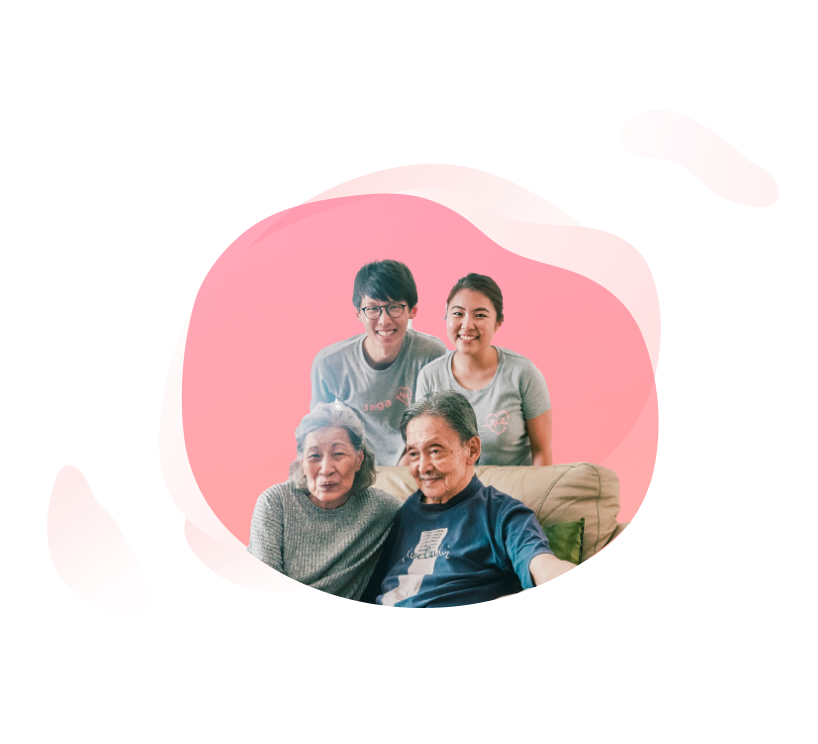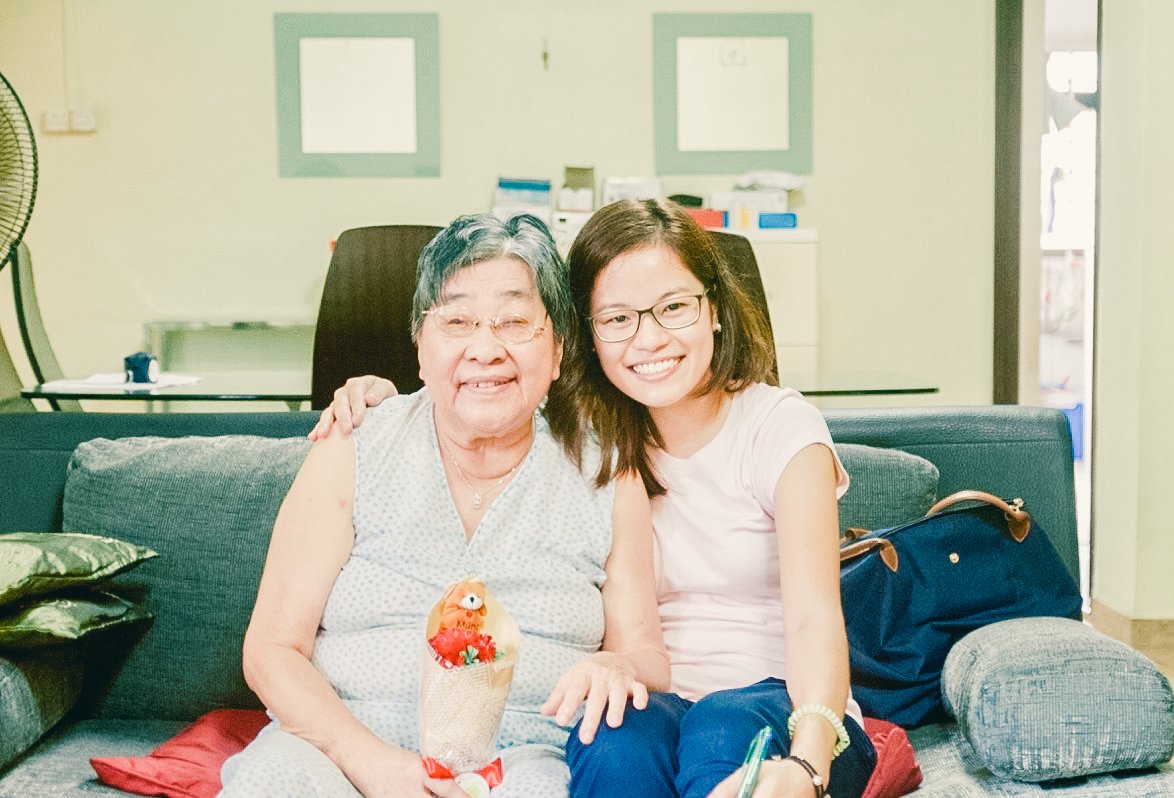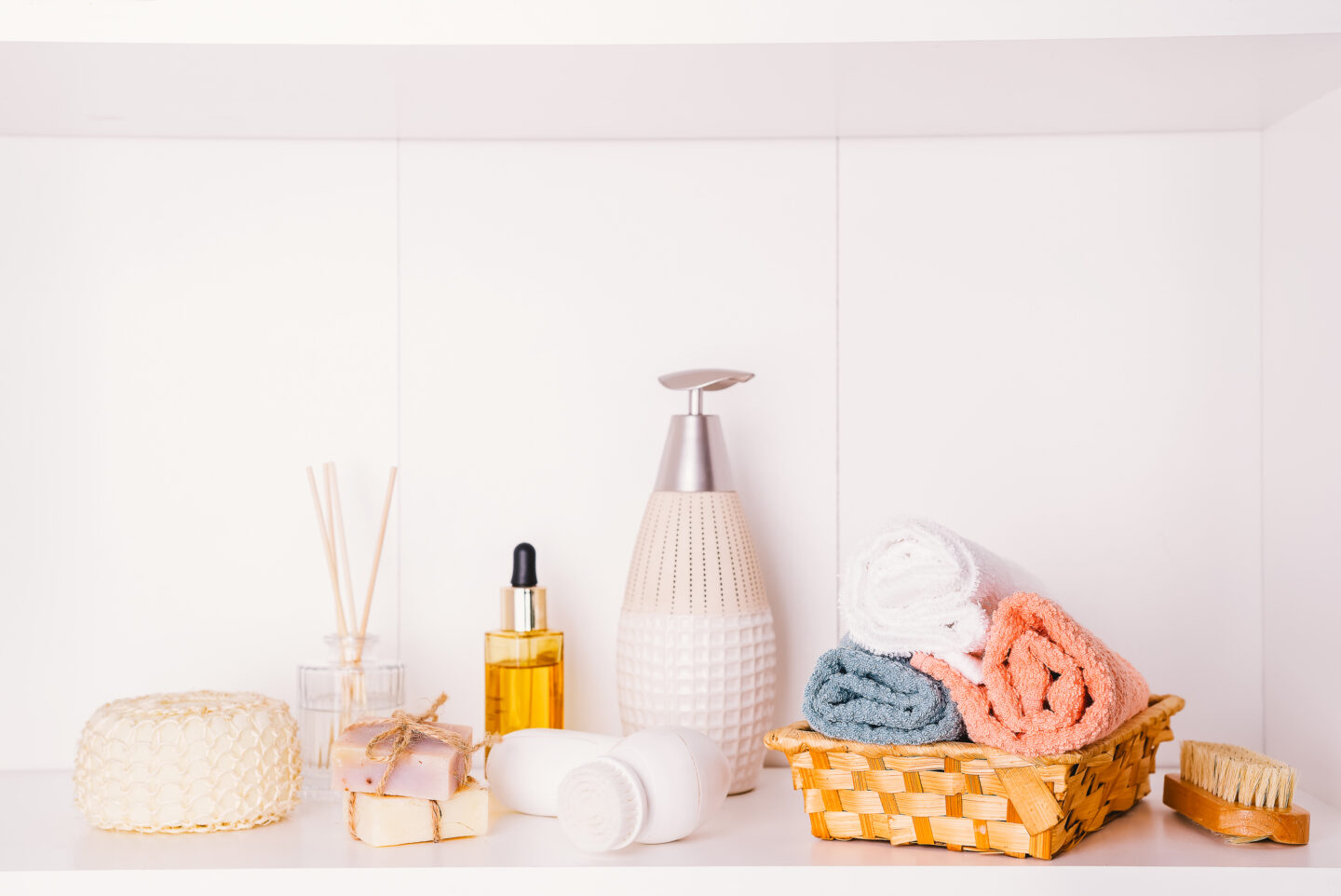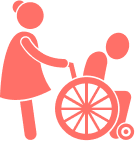Dementia Care Guide
Caring for a Family Member with Dementia/ Alzheimer's Disease in Singapore


How to Care for a Family Member with Dementia or Alzheimer’s Disease in Singapore
It is a common misconception that dementia is part and parcel of normal ageing, when it is actually not. Dementia actually refers to a set of conditions characterised by memory loss, confusion and behavioural changes. One of the most common forms of dementia is Alzheimer’s disease (60% to 80% of cases).
You may be feeling distressed or at a loss if your family member is suffering from dementia or Alzheimer’s. With sufficient support and appropriate steps taken, such a condition can be managed.
This guide will provide practical tips and suggestions on how to care for a person with dementia.
Handling Memory Loss and Confusion
With a progressive decline in cognitive functions of the dementia patient, memory loss & confusion are some of the more difficult issues caregivers may face.
- Keep up engagement – Engage them in simple activities, such as jigsaw puzzles, walking around your area of residence in Singapore, etc. Avoid letting their mind idle for too long, which could hasten the decline in cognitive function.
- Provide memory triggers – Be it photographs or treasured objects, providing a trigger will help to remind them of things or events, which could help to improve their mood and reduce aggression.
- Maintain consistency – Create a regular routine for your patient to bring structure into his/her lifestyle.
- Write reminders – Writing down your loved one’s medication schedules, dates and times for events, such as a hospital appointment, helps them be independent.
- Label things – Provide helpful reminders to encourage them to be as independent as possible.
- Simple communication – Use simple language and break down complex instructions to reduce confusion and misunderstandings.
Handling Loss of Communication
Patients with dementia may have difficulty finding the correct words, understanding instructions, and employ many gestures rather than verbally communicating. Often, talking to a family member with dementia may prove challenging and frustrating. However, remember that they are not trying to be difficult on purpose, and try your best to empathise with them. We have compiled some tips to help you and your dementia patient communicate effectively:
- Short and sweet conversations – Avoid lengthy explanations and break down instructions into simpler steps so that they are easier to take in.
- Be patient and gentle – Having to repeat certain things to them may be frustrating but getting agitated will only make the situation worse. Wait for them to reply and do not interrupt them. Avoid arguing or criticising them.
- Prompt gestures – Encourage them to use non-verbal forms of communication to express themselves.
- Ask one thing at a time – Dementia patients often find it challenging to focus. Let them concentrate on answering one thing at a time.
- Simple, specific questions – Ask questions that have simple answers, such as yes/no questions. For example, ask “Do you want to wear this blue shirt today?” instead of “What would you like to wear today?”
Keep them focused – Remove distractions such as the TV when communicating with dementia patients.

Handling Aggression
Anxiety, confusion and negative feelings may trigger aggressive behaviour in dementia patients. Often, such behaviour is triggered by particular actions or events and it may be frustrating when you are unable to understand the specific cause.
- Identify the trigger(s) – Try to find out exactly what is provoking your loved one or making them feel uncomfortable or upset. Consider factors such as the environment, people, pain, or discomfort.
- Stay calm, speak patiently – Do not argue with them even if you disagree. Be reassuring and convince your loved ones that there is no immediate danger. Show that you care and you’re only looking out for their safety.
- Your safety first – Keep any dangerous items or tools such as knives and scissors locked out or out of sight. Install door and window locks. If necessary, leave for a safe location and call for help.
- Consult a professional – They can provide concrete suggestions on how you can protect yourself and your loved ones.
Ensure their needs are met – Understand what they need, their feelings and make the necessary adjustments. Also engage the person in frequent one-to-one conversations so they do not feel isolated, which is a possible trigger for aggressive behaviour.
Handling Wandering
Due to confusion or being disoriented, a dementia patient may wander aimlessly, trying to search for something or attempt to fulfil previous obligations such as going to work. Sometimes, the patient may even get lost. It is important to be on the lookout for such behaviour and have preventive measures in place.
- Apply for a safe return card – It provides identification for your loved one in case he or she gets lost. Find out how to apply for the card from Alzheimer’s Disease Association (Singapore) here.
- Keep an eye on them – Do not leave your loved ones unsupervised. Always have someone to keep an eye on them at home or when heading out.
- Secure your home – Install locks that are out of sight, make windows and doors difficult for them to open, and set up alarms to go off when a door or window is opened.
- Stick to a consistent routine – Create a regular day plan and keep your loved ones engaged in activities. You can also consider bringing your loved one to a Senior Activity Centre and signing up for activities targeted for the elderly at your nearby Community Club (CC) or Residents’ Committee (RC) Centre in Singapore.
- Tracking devices – They can be a lifesaver in locating your loved one quickly and safely.
Prepare an action plan – Keep a record of places your loved one might go and have a list of people to call for help.
Handling Hallucinations and Delusions
Due to changes in the brain arising from dementia, some patients may start to have false perceptions of the things around them, including hallucinating and delusional thoughts. As a caregiver, you may be frightened when such a situation arises, but it is important that you first remain calm before attempting to calm your loved one down.
- Be reassuring – Remain calm, show that you care, and comfort the patient. Let them know that you are there for them.
- Do not be critical – Try to understand why or what the hallucination is to them. Do not argue about what they believe to be seeing or hearing.
- Engage them in another activity – Bring them out on a walk or move them to another room.
Adjust the environment – Switch off any TV shows, computers, or appliances that are emitting sounds in the background. They may be contributing to their hallucination or delusional thoughts since they cannot separate them from reality.
Handling Sleep Problems and Sundowning
Sundowning is also known as “late day confusion”. Dementia symptoms may be more prevalent in the afternoon and evening. Due to their confusion and memory loss, they may also be unable to distinguish between daytime and night-time.
- Maintain a routine – Keep their day-to-day activities structured, with regular meal, shower, and bedtime.
- Avoid napping in the eye – Daytime naps will make it more difficult for your patient to sleep well at night. Instead, keep them engaged in other activities throughout the day.
- Encourage exercise – Exercise promotes a healthier lifestyle and keeps the mind active before winding down at night. Consider going to your nearby exercise corner, brisk walking around your neighbourhood, simple stretches, and Qigong.
- Avoid caffeine and sugar – Especially from the afternoon onwards.
Adjust the environment – In the daytime, ensure that the place is well-lit (e.g. drawing the curtains and opening the windows) to make it clearer to the patient that it is daytime. Before bedtime, turn off the lights, reduce ambient noise, and adjust the room to a comfortable temperature to prepare a conducive environment for sleep.

Feeding and Nutrition
Select healthier food options – Cut down on processed foods and foods with high cholesterol, sodium and fat. Try to select foods with the Healthier Choice symbol.
- Have fixed mealtimes – Having a routine will help your dementia patient feel less confused and afraid and promotes a sense of familiarity.
- Avoid caffeine and sugar – Reduce intake of sugary or caffeinated foods, especially in the daytime. This helps to maintain sleep hygiene and reduce sleep problems such as sundowning.
- Prepare favourite and familiar foods –Familiar foods are a source of comfort and reduce anxiety and distress for the person.
- Remind them to eat slowly – Give them ample time to finish their food. Do not rush them when they are eating as it will elevate their anxiety.
- Eat together with your loved one – Your loved one is likely to follow you as you eat and eating with them is also a source of social interaction and companionship.
- Provide options to encourage independent thinking – Give them some freedom of choice for their food options. This encourages independent thinking.
- Serve several small meals – If the patient has decreased appetite, having small portions of food each time may help.
Choose easy to swallow foods – Some examples are mashed tofu, scrambled eggs, and porridge. These kinds of foods are considered a soft diet. Especially in the later stages of dementia, the risk of choking may be higher.
Bathing and Toileting
To some dementia patients, bathing is an unfamiliar and scary experience. You may experience much resistance if you try to bathe them against their will, and even physical aggression.
- Fixed bathtime – Have a fixed bathtime to encourage familiarity and reduce anxiety.
- Use wet cloth/sponge/basin – Ask your loved one to wipe himself or herself with a wet sponge
- Inform them of what you are going to do – Break down instructions step-by-step for them to follow or pre-empt them about the steps you are going to take (e.g. “I am going to wipe your arms now”) to reduce anxiety.
- Look out for them – Do not leave your loved one unsupervised
- Get professional help – Hire a professional caregiver to assist and train you in helping your loved one maintain his or her personal hygiene.
Managing Incontinence
- Make it easy to find the toilet – Put up simple signs and light up pathways at night to indicate clearly to the patient how to get to the toilet independently.
- Note down toileting habits – Note down the times they usually need the toilet and actively remind them to use the toilet at these timings.
- Purchase incontinence aids – Purchase incontinence pads, commodes, etc. A commode can be placed near the patient’s room if the toilet is not nearby. Incontinence products can be found in hospitals and some pharmacies. Do take a look at our products for handling incontinence and more on our specially-curated JagaStore.
- Use easy to wear clothes – Use clothing that is easy to put on, remove and wash. Clothes with elastic bands and velcro are some good options for patients with dementia.
Get professional help – Jaga-Me offers high quality home nursing services for dementia patients. Our trained nurses can help your loved one change his or her incontinence pad and train you to handle these issues.

Making the Home Safer Through Home Modifications
For caregivers, home modifications are often forgotten but immensely useful in aiding you in caring for your loved one. We have compiled a list of useful (but definitely not exhaustive!) list of ways you can adjust your living environment.
- Install locks on windows and doors – This prevents your loved one from wandering outside alone.
- Light up pathways and put up signages – This allows your loved one to move to the toilet independently.
- Reduce fall risk in the toilet – Install grab bars, shower seats, and non-slip flooring in the toilet to reduce fall risk.
- Keep dangerous items hidden – Including poisonous items e.g. detergents and mosquito repellant
- Have a set of spare keys – In case you are locked out by your loved one.
- Create clear pathways – Remove obstacles and hazardous items lying around the home to reduce fall risk.
- Remove or tape down carpets and rugs – to prevent tripping
Seeking Help
- Dementia support groups
Even though you are taking care of your loved one, it is crucial for you to take care of yourself as well. Joining a caregiver support group is helpful in connecting with other caregivers facing similar struggles in an understanding environment.
Alzheimer’s Disease Association (Singapore) has caregiver support groups specially for dementia caregivers. You can find out more here.
- Home respite care
Taking care of your loved one at home in a familiar environment rather than leaving them in a nursing home helps them age in place and lead more comfortable and happy lives.
Researchers from the Institute of Mental Health (IMH) found that ¾ of the burden of caring for dementia patients falls on the caregiver, and so help must start from the home.
At Jaga-Me, we understand your struggles. That’s why we offer professional caregiving service tailored just for you. Learn more about our home care services here so you can enjoy a well-deserved break while you leave your loved one in our safe hands.
- Financial assistance
Need some financial aid in taking care of your dementia patient? Jaga-Me has compiled a comprehensive list of financial assistance schemes for care recipients and caregivers in Singapore for your reference.
Jaga-Me Can Help
Caring for a patient with dementia is not an easy task. Jaga-Me can help to ease your burden. Book our services or call us to find out more about our dementia day and home care services in Singapore.









